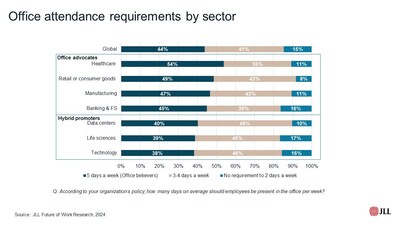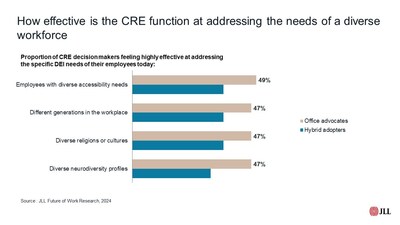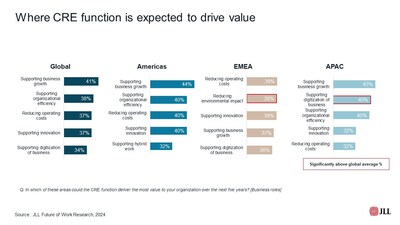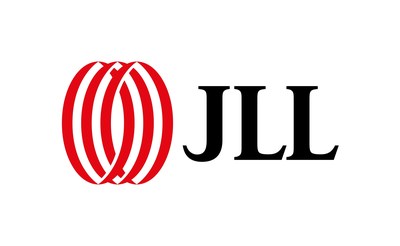Business leaders look to increase real estate investment but expect smarter use of portfolio
Rhea-AI Summary
JLL's Future of Work Survey reveals that 65% of business leaders expect their CRE budgets to increase by 2030, despite challenging market conditions. Key findings include:
1. 64% of leaders plan to increase and rebalance headcount by 2030.
2. 62% expect increased office space use, with 85% requiring at least 3 days of office attendance weekly.
3. 44% of organizations are now 'office advocates', up from 34% in 2022.
4. CRE functions are expected to support business growth (41%), enable efficiency (38%), and reduce costs (37%).
5. 70% of CRE activities are expected to be AI-supported by 2030.
The survey highlights the need for CRE teams to balance priorities, leverage technology, and demonstrate value to the C-suite in an evolving work landscape.
Positive
- 65% of business leaders expect CRE budgets to increase by 2030
- 62% of respondents plan to increase office space use
- 85% of organizations require at least 3 days of office attendance weekly
- 64% of leaders plan to increase and rebalance headcount by 2030
- 70% of CRE activities expected to be AI-supported by 2030
Negative
- 41% of CRE decision makers report challenges with long-term thinking and investing
- 41% believe CRE is perceived as a cost center rather than a value driver
JLL's Future of Work Survey uncovers new opportunities for corporate real estate as two-thirds of business leaders expect their CRE budget to increase between now and 2030
This year's findings are unveiled through a series of articles exploring key areas of focus for corporate real estate teams: Managing the implications of shifting work patterns; Partnering with the C-suite to support CRE investment; Identifying CRE activities for 'AI copiloting'; Moving from ambition to action on sustainability commitments; and Defining the future-fit CRE function. The first two articles, launched today, dive into the effects of shifting work patterns on workplace expectations, and what the changing world of work means for the way the CRE function operates as more than
"Since our 2022 survey, the CRE landscape has become increasingly complex and dynamic, evolving toward better office use. We see that in these results, and in our conversations with clients," said Neil Murray, Global CEO, Work Dynamics, JLL. "Looking ahead, business and CRE leaders working to drive talent and efficiency throughout their organization must consider the unique needs of their organization, and leverage tools such as tech, AI, and upskilling, as well as strategic partnerships across the value chain to enable the CRE function to reach its full potential as a powerful agent of transformation."
Competing visions on the most efficient workstyles create renewed CRE challenges
Business leaders are mainly focused on three corporate goals over the next five years: growing revenue through expansion and M&A (
Strong momentum toward office-based work since 2022 has brought forth expectations among respondents to increase use of office space (
Globally, hybrid work is more likely to take place at large organizations in EMEA, where hybrid workstyles are considered a key part of the employee value proposition, and largely in sectors including e-commerce, energy & renewables, technology and life sciences. Office advocates alternatively tend to be small-to-medium sized companies in APAC or the
Today's office advocates also make a concerted effort to address diverse workplace needs – they are more focused on making accessible workplaces (
"The future of work looks different across companies and regions, reflecting the unique nature of organizations and employee needs. It keeps shifting and requires building evolutionary office programs and spaces, able to adapt to continuous changes in the workstyles," said Cynthia Kantor, CEO, Project & Development Services, JLL. "Globally, as CRE budgets and footprints receive new investment, the corporate real estate function must effectively partner with the C-suite to demonstrate the desired value."
The corporate real estate function can serve as a powerful agent of transformation, particularly with the use of technology, AI and the support of strategic partners
The value the corporate real estate function can deliver will vary depending on the needs of the organization and regional priorities. Globally, business leaders believe CRE can add the most value by supporting business growth (
These varying expectations around value require agility throughout CRE functions, in a context where
Technology is also emerging with greater impacts for CRE, as more decision-makers expect to report to business transformation or technology by 2030. CRE leaders believe that
About JLL
For over 200 years, JLL (NYSE: JLL), a leading global commercial real estate and investment management company, has helped clients buy, build, occupy, manage and invest in a variety of commercial, industrial, hotel, residential and retail properties. A Fortune 500® company with annual revenue of
Contact: Allison Heraty
Phone: +1 312 228 3128
Email: Allison.Heraty@jll.com
![]() View original content to download multimedia:https://www.prnewswire.com/news-releases/business-leaders-look-to-increase-real-estate-investment-but-expect-smarter-use-of-portfolio-302242353.html
View original content to download multimedia:https://www.prnewswire.com/news-releases/business-leaders-look-to-increase-real-estate-investment-but-expect-smarter-use-of-portfolio-302242353.html
SOURCE JLL












